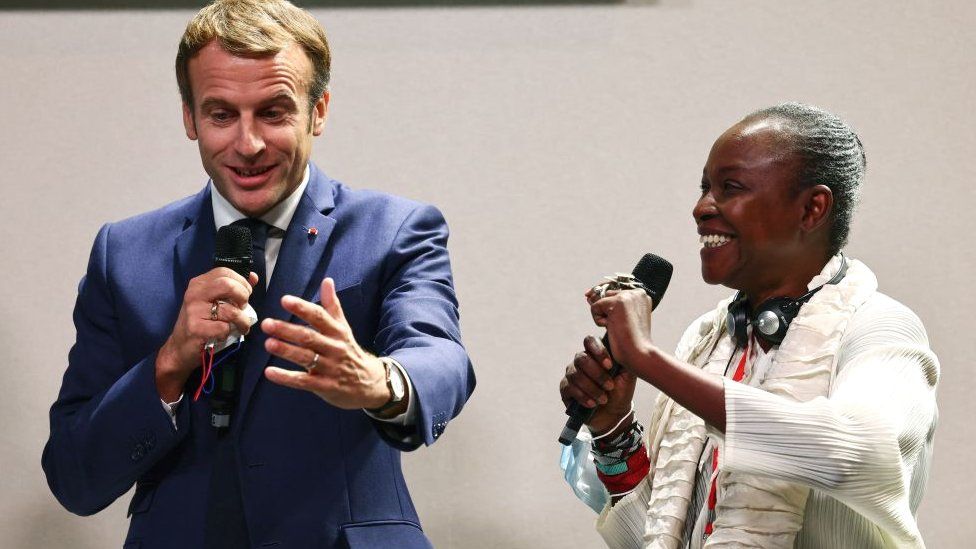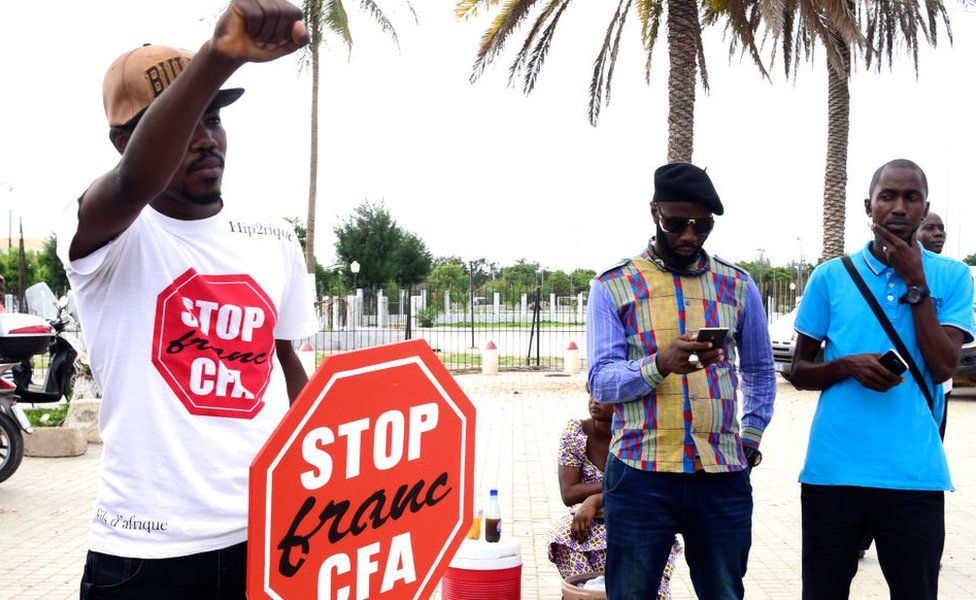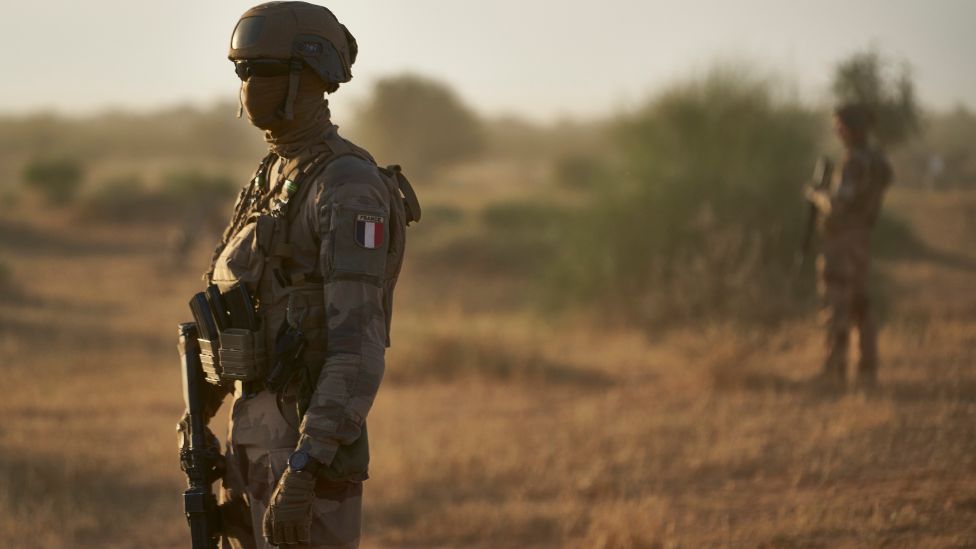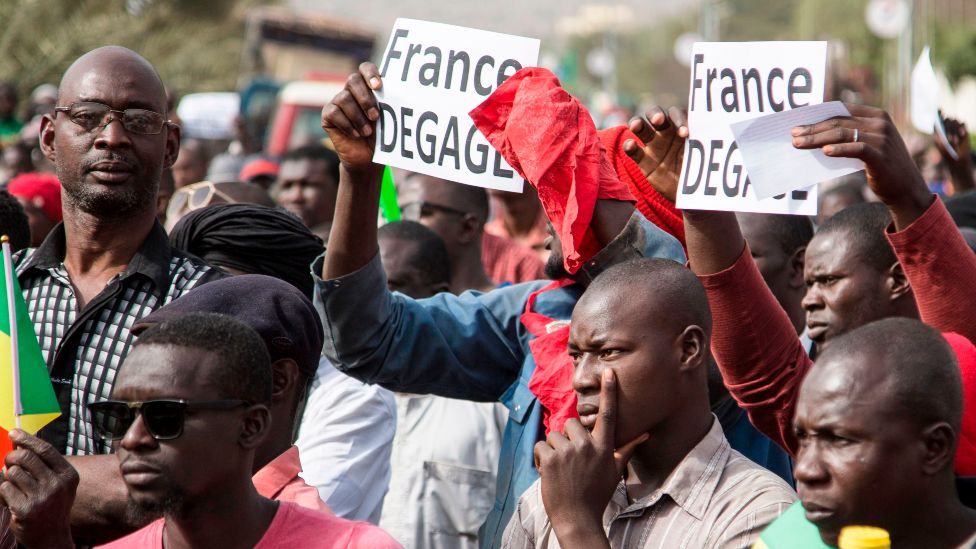風蕭蕭_Frank
以文會友為什麽法國在西非麵臨如此多的憤怒
https://www.bbc.com/news/world-africa-59517501
作者:Paul Melly 非洲分析師 2021 年 12 月 5 日
馬裏發生多起針對法國的抗議活動
一切都是如此積極地開始。 哪裏出了問題? 為什麽法國現在在非洲顯得如此不受歡迎?
法國總統馬克龍增加了對非洲大陸的援助,開始歸還殖民戰爭期間被盜的文物,並超越通常的政府間關係,吸引年輕一代和民間社會參與。
他讓法國軍隊留在薩赫勒地區,與聖戰武裝分子作戰,這些武裝分子殺害了許多當地平民、警察和士兵,並支持西非經共體地區集團,因為該組織試圖捍衛選舉政治,反對軍事接管。
今年,他飛往盧旺達,公開承認法國在 1994 年種族滅絕期間的失敗。
然而,他的國家現在成為非洲怨恨和批評的目標,其規模可能是前所未有的。
上個月,一支法國軍隊車隊向北前往支持打擊伊斯蘭武裝分子,在穿越布基納法索和尼日爾時多次遭到抗議者封鎖。
9月,馬克龍開始縮減在馬裏的駐軍規模後,馬裏總理喬格爾·馬伊加在聯合國發表講話,指責法國“中途拋棄了自己的國家”,引起了一陣同情的評論。 國家。
在進步的西非評論員和城市青年中,現在經常聽到廢除非洲金融共同體法郎的呼聲。非洲法郎是許多法語國家使用的區域貨幣,在法國政府的擔保下與歐元掛鉤。 批評者稱,這使法國能夠控製使用該係統的國家的經濟,而法國則表示,這保證了經濟穩定。
新殖民主義的傲慢
如何解釋這個悖論? 一位比最近幾位前任更關心非洲、也更了解非洲大陸正在發生變化的總統,為何會遇到幾十年來從未有過的法國不受歡迎的情況?
當然,馬克龍先生自信(批評者會說傲慢)的個人風格是一個因素。
喀麥隆出生的策展人 Koyo Kouoh(右)和法國總統埃馬紐埃爾·馬克龍於 2021 年 10 月 8 日在法國蒙彼利埃舉行的非法峰會上關於歸還非洲遺產的會議上發表講話
盡管向非洲伸出援手,馬克龍總統仍麵臨強烈反對,他也犯過一些外交錯誤。
2019 年 11 月,13 名法國士兵在馬裏的一次直升機失事中喪生後,他要求西非領導人飛往法國參加緊急峰會,這種爆發被視為新殖民主義的傲慢,特別是考慮到馬裏和尼日爾最近遭受了更嚴重的軍事損失。
馬克龍總統被迫迅速調整路線,飛往尼日爾首都尼亞美,悼念尼日爾陣亡軍人,並將峰會推遲到 2020 年 1 月。
但法國目前不安的原因也可以追溯到馬克龍 2017 年當選之前的幾十年。
科特迪瓦政治分析家西爾萬·恩格桑(Sylvain Nguessan)解釋說:“你可以引用與殖民統治有關的曆史爭議。我們中的許多人都是了解殖民時期及其恥辱的父母的孩子。”
在獨立後的早期幾十年裏,法國與非洲領導人和精英保持著緊密的個人聯係網絡(被稱為“法國非洲”),這種網絡常常陷入既得利益的相互保護,而很少考慮人權或透明度。
在外部勢力中,巴黎並不是唯一一個與獨裁盟友勾結的國家,但其關係尤其密切且不容置疑。
魅力與變革
最致命的失敗發生在 1994 年的盧旺達,當時法國沒有采取行動,而其盟友、時任總統朱韋納爾·哈比亞利馬納 (Juvenal Habyarimana) 的政權已開始準備種族滅絕。
2017 年 9 月 16 日,塞內加爾達喀爾,一名男子在反對非洲金融共同體法郎的反殖民示威中舉起拳頭。CFA 是一種殖民時代的貨幣,至今仍在非洲的幾個前法國殖民地使用
從 20 世紀 90 年代中期開始,多國政府致力於改革法國與非洲的接觸,並更加重視發展和民主治理。
但後來勢頭減弱。
尼古拉·薩科齊 (Nicolas Sarkozy) 2007 年就任總統時,極其缺乏機智地表示“非洲人還沒有充分進入曆史”。 他偏愛老盟友,例如自 1967 年以來一直統治加蓬的邦戈家族。
2012 年弗朗索瓦·奧朗德就任總統時,他別無選擇,隻能關注薩赫勒地區(撒哈拉沙漠以南的一大片土地)的安全問題。 他從來沒有真正擁有恢複改革努力的政治力量。
但隨著馬克龍先生就職,法國有了一位充分意識到變革必要性的總統,並且擁有完成這項任務的政治影響力和個人熱情。
2017年,他告訴布基納法索首都瓦加杜古的學生,如果非洲各國政府願意,法國將支持非洲金融共同體法郎的改革。 他還邀請民間社會、青年和文化人士參加今年在蒙彼利埃舉行的法國-非洲峰會,而不是像往常一樣邀請總統。
薩赫勒——潰爛的傷口
然而,他願意直言不諱、挑戰舊結構和質疑舒適假設的意願並不總是奏效,即使是在那些呼籲變革的人中也是如此。
法國士兵在布基納法索北部與馬裏和尼日爾邊境的一次行動中監視鄉村地區 - 2019 年 11 月 10 日, 盡管法國采取了反恐行動,武裝分子仍然是西非廣大薩赫勒地區的一個主要問題。此外,薩赫勒局勢已惡化為潰爛的傷口。
法國的軍事存在加劇了整個西非日益普遍的不滿情緒。
盡管法國進行了大規模和持續的軍事努力,部署了 5000 多名士兵,並造成 50 多人死亡,但仍無法決定性地克服聖戰分子的威脅,聖戰分子對當地社區和安全部隊的襲擊仍在繼續。
原因很複雜,既有軍事的,也有社會的,也有環境的和經濟的。
然而,相當一部分當地輿論認為,法國作為西方高科技軍事強國,本來應該能夠“解決”這個問題,如果不能這樣做,現在就應該讓路。
這些情緒似乎激發了封鎖法國軍隊車隊的抗議者。
正如恩格桑先生指出的那樣,這是在早些時候引起不滿的原因之後發生的:“薩科齊在達喀爾的演講、馬克龍在瓦加杜古的演講、科特迪瓦的戰爭、反恐行動令人沮喪的結果。
“問題涉及貨幣、債務、對當地獨裁者的支持以及措辭不當。”
2020 年 1 月 10 日,在巴馬科舉行的針對法國和駐馬裏聯合國部隊的抗議活動中,人們舉著法文標語:“法國滾出去”。
法國仍然被視為保守派建製派的支柱——即使支持民主機構,但潛在的社會和公共因素也會影響一些人的態度。
薩赫勒地區的一名高級軍官表示,他認為法國人是馬裏北部圖阿雷格人前分離主義叛亂分子的盟友——這一指控在巴黎遭到了強烈而可信的否認。
法國對西非區域機構西非經共體的支持也存在類似的複雜性,該機構目前正試圖向馬裏和幾內亞的政變領導人施壓,要求其迅速恢複文官憲政。
越來越多的年輕人將這一地區集團視為現任總統的俱樂部,批評操縱民主規則的文官統治者的速度太慢,也不願承認民眾對承諾改革的軍事領導人的支持力度。
因此,在支持西非經共體作為合法的非洲危機管理機構的過程中,法國最終被視為守舊派的支持者。
保羅·梅利是倫敦智庫查塔姆研究所非洲項目的顧問研究員。
Why France faces so much anger in West Africa
https://www.bbc.com/news/world-africa-59517501
By Paul Melly Africa analyst
Mali has witnessed several protests against France
French President Emmanuel Macron has increased aid to the continent, begun the return of cultural artefacts stolen during the colonial wars and reached out beyond the usual inter-government ties to engage younger generations and civil society.
He has kept French troops in the Sahel to fight the jihadist militants that kill so many local civilians, police and soldiers and supported the regional bloc Ecowas as it tries to defend electoral politics against military takeovers.
This year he flew to Rwanda to publicly acknowledge French failures during the 1994 genocide.
Yet his country is now the target of embittered African complaints and criticism on a scale that is probably unprecedented.
Last month, a convoy of French troops heading north to support the fight against Islamist militants was repeatedly blockaded by protesters as it crossed Burkina Faso and Niger.
In September Mali's Prime Minister Choguel Maïga was met with a wave of sympathetic comment when he used a speech at the UN to accuse France of "abandoning his country in mid-flight", after Mr Macron began to scale back the deployment of troops in the country.
Among progressive West African commentators and urban youth, it is now commonplace to hear calls for the abolition of the CFA franc - the regional currency used by many francophone countries and which is pegged to the euro under a French government guarantee. Its critics say this enables France to control the economies of those countries which use it, while France says it guarantees economic stability.
Neo-colonial arrogance
What explains this paradox? How is it that a president more concerned for Africa than most recent predecessors, and more aware too of how the continent is changing, encounters a level of French unpopularity not felt for decades?
Certainly, Mr Macron's self-confident - critics would say arrogant - personal style is a factor.

He has made his share of diplomatic blunders.
After 13 French troops died in a helicopter crash in Mali in November 2019 he demanded that West African leaders fly to France for an emergency summit, an outburst perceived as neo-colonial arrogance, particularly as Mali and Niger had suffered far heavier recent military losses.
President Macron was forced into a rapid course-correction, flying to Niamey, Niger's capital, to pay his respects to the Nigérien military dead and postponing the summit until January 2020.
But the causes of France's current discomfort also extend back to decades before Mr Macron's election in 2017.
"You can cite historical controversies linked to colonisation. Many of us are the children of parents who knew the colonial period and its humiliations," explains Ivorian political analyst Sylvain Nguessan.
During the early post-independence decades, France maintained a dense web of personal connections with African leaders and elites - dubbed "françafrique" - which too often slid into a mutual protection of vested interests, with little regard for human rights or transparency.
Among outside powers, Paris was far from alone in colluding with dictatorial allies, but its relationships were particularly close and unquestioning.
Charisma and change
The most damning failure came in Rwanda in 1994, when France failed to act even as its ally, the regime of then-President Juvenal Habyarimana, began to prepare genocide.

From the mid-1990s onwards several governments worked to reform France's engagement with Africa and give more priority to development and democratic governance.
But momentum later faltered.
Nicolas Sarkozy began his tenure as president in 2007 by remarking, with a spectacular lack of tact, that "the African man has not sufficiently entered into history". He favoured old allies such as the Bongo family, who have governed Gabon since 1967.
When François Hollande became president in 2012 he had no choice but to focus on security issues in the Sahel - a swathe of land south of the Sahara desert. He never really had the political strength to revive reform efforts.
But with Mr Macron's accession to office, France had a president fully aware of the need for change - and with the political clout and personal enthusiasm to attack the task.
In 2017 he told students in the Burkinabe capital, Ouagadougou, that France would back a reform of the CFA franc if African governments wanted this. He also invited civil society, youth and cultural figures to this year's France-Africa summit in Montpellier, rather than the usual flock of presidents.
Sahel - a festering wound
Yet his readiness to speak plainly, challenge old structures and question comfortable assumptions has not always played well, even among those who are clamouring for change.
 IMAGE SOURCE,AFP Image caption,
IMAGE SOURCE,AFP Image caption,
Moreover, the situation in the Sahel has deteriorated into a festering wound.
The French military presence fuels an increasingly widespread sense of grievance across West Africa.
Despite a massive and sustained military effort - with more than 5,000 troops deployed and more than 50 killed - France has not been able to decisively overcome the threat from jihadists, whose attacks on local communities and security forces continue.
The reasons are complex, both military and social, environmental and economic.
Yet a significant proportion of local public opinion feels that France, as a high-tech Western military power, should have been able to "sort" the problem and should now get out of the way if it cannot do so.
Those feelings seem to have motivated the protesters who blockaded the French army convoy.
And this comes after earlier causes of resentments, as Mr Nguessan points out: "The speeches of Sarkozy in Dakar, Macron in Ouagadougou; the war in Ivory Coast; the discouraging results of the campaign against terrorism.
"Questions related to the currency, debt, support for local dictators and ill-chosen words."
 IMAGE SOURCE,AFP Image caption,
IMAGE SOURCE,AFP Image caption,
But underlying social and communal factors also shape the attitudes of some.
One senior Sahel military officer says he sees the French as allies of Tuareg former separatist rebels in northern Mali - an allegation fiercely and credibly denied in Paris.
Similar complexities surround France's support for West Africa regional body Ecowas - which is currently trying to pressure coup leaders in Mali and Guinea to rapidly return their countries to civilian constitutional rule.
A growing number of young people regard the regional bloc as an incumbent presidents' club, too slow to criticise civilian rulers who manipulate democratic rules and unwilling to acknowledge the strength of popular support for military leaders promising reform.
So in backing Ecowas as the legitimate African crisis management institution, France ends up being perceived as a prop for the old guard establishment.
Paul Melly is a consulting fellow with the Africa Programme at the think-tank Chatham House in London.




